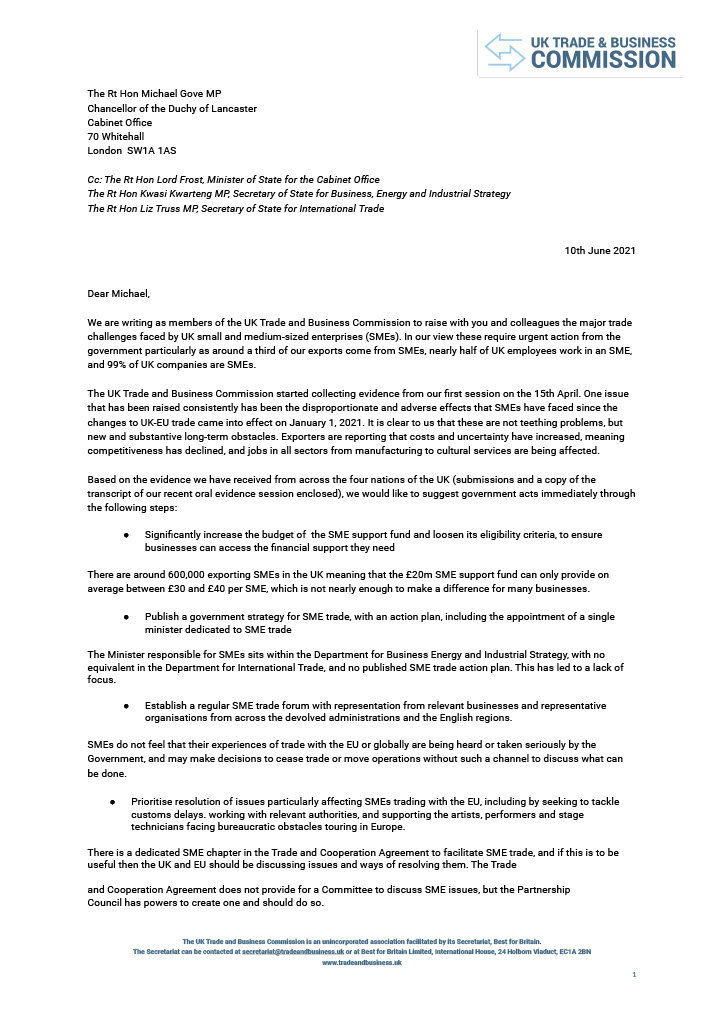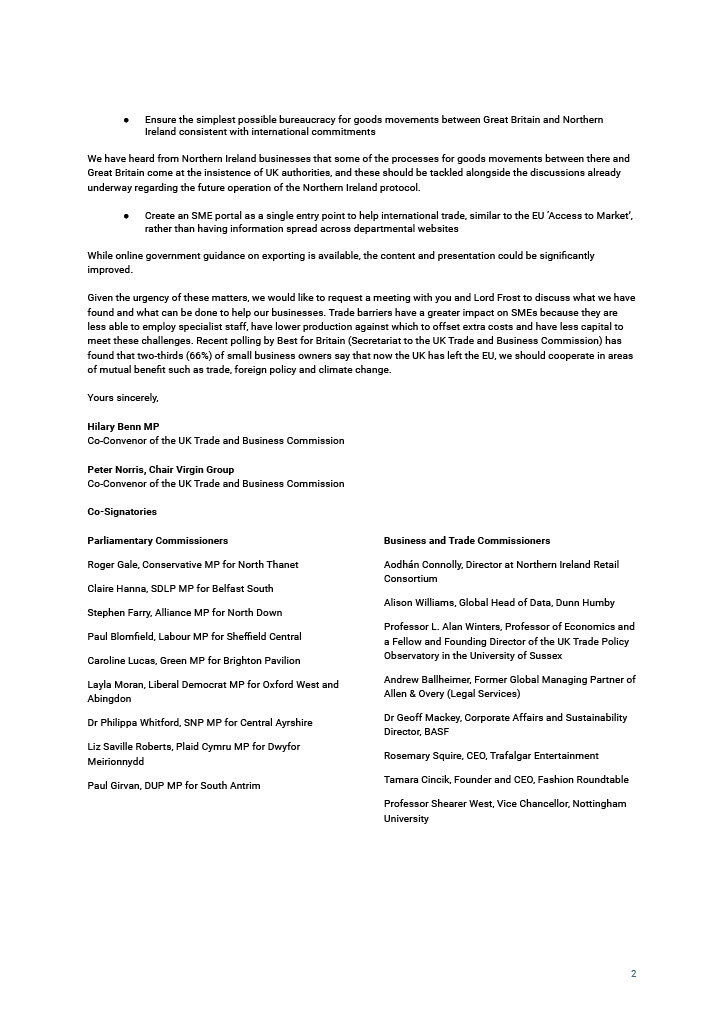Government urged to boost SME support fund to help firms hit bypost-Brexit red tape
The cross-party UK Trade and Business Commission has urged the government to increase funding for small businesses hit by post-Brexit red tape, after hearing evidence from firms struggling to adapt to the UK’s new trading relationship with Europe.
In its first set of recommendations since launching in April, the Commission also called for the appointment of a dedicated minister for SME trade, and a single portal for small businesses to access advice on international trade.
It comes after it emerged that businesses have so far only managed to apply for £4.3 million of the government’s £20 million Brexit support fund, which is due to close at the end of the month. The Commission is calling on the government to significantly increase the budget of the SME support fund and loosen its eligibility criteria, to ensure businesses can access the financial support they need.
The recommendations were made in a letter to Cabinet Office Minister Michael Gove signed by all the Commission’s members, which include MPs from each of the main Westminster parties and leading business representatives. It requests a meeting with Michael Gove and Lord Frost to discuss the Commission’s proposals and evidence it has received so far.


The Commission, whose secretariat is provided by the pro-internationalist group Best for Britain, held an evidence session with small businesses on 27 May to discuss the impact of new barriers to trade with Europe. Small firms at the session warned that post-Brexit red tape was threatening the viability of their businesses and demanded urgent action to protect future investment and jobs in the UK.
Hilary Benn MP who co-chairs the UK Trade and Business Commission said:
“The heartfelt testimony we've heard about business being lost, extra costs and complex bureaucracy is the clearest sign that our new trading relationship with Europe is not working for many small businesses.
“SMEs account for three fifths of the employment and around half of turnover in the UK private sector. They are in urgent need of assistance and these recommendations are the first step.”
Naomi Smith, Chief Executive of Best for Britain said:
"Business owners are rightly angry that while the Government are ready to put up £200 million for a new yacht, SMEs have been offered £20million to cope with costly Brexit induced red tape, equating to a paltry £30-£40 per business.
“The Government’s thin agreement with the EU is not equipped to deal with the complexity of modern trade and SMEs are in desperate need of help. The Government must act on these recommendations now to save jobs.
The letter in full
The Rt Hon Michael Gove MP Chancellor of the Duchy of Lancaster
Cc: The Rt Hon Lord Frost, Minister of State for the Cabinet Office
The Rt Hon Kwasi Kwarteng MP, Secretary of State for Business, Energy and Industrial Strategy The Rt Hon Liz Truss MP, Secretary of State for International Trade
10th June 2021
Dear Michael,
We are writing as members of the UK Trade and Business Commission to raise with you and colleagues the major trade challenges faced by UK small and medium-sized enterprises (SMEs). In our view these require urgent action from the government particularly as around a third of our exports come from SMEs, nearly half of UK employees work in an SME, and 99% of UK companies are SMEs.
The UK Trade and Business Commission started collecting evidence from our first session on the 15th April. One issue that has been raised consistently has been the disproportionate and adverse effects that SMEs have faced since the changes to UK-EU trade came into effect on January 1, 2021. It is clear to us that these are not teething problems, but new and substantive long-term obstacles. Exporters are reporting that costs and uncertainty have increased, meaning competitiveness has declined, and jobs in all sectors from manufacturing to cultural services are being affected.
Based on the evidence we have received from across the four nations of the UK (submissions and a copy of the transcript of our recent oral evidence session enclosed), we would like to suggest government acts immediately through the following steps:
Significantly increase the budget of the SME support fund and loosen its eligibility criteria, to ensure businesses can access the financial support they need.
There are around 600,000 exporting SMEs in the UK meaning that the £20m SME support fund can only provide on average between £30 and £40 per SME, which is not nearly enough to make a difference for many businesses.
Publish a government strategy for SME trade, with an action plan, including the appointment of a single minister dedicated to SME trade.
The Minister responsible for SMEs sits within the Department for Business Energy and Industrial Strategy, with no equivalent in the Department for International Trade, and no published SME trade action plan. This has led to a lack of focus.
Establish a regular SME trade forum with representation from relevant businesses and represenative organisations from across the devolved administrations and the English regions.
SMEs do not feel that their experiences of trade with the EU or globally are being heard or taken seriously by the Government, and may make decisions to cease trade or move operations without such a channel to discuss what can be done.
Prioritise resolution of issues particularly affecting SMEs trading with the EU, including by seeking to tackle customs delays, working with relevant authorities, and supporting the artists, performers and stage technicians facing bureaucratic obstacles touring in Europe.
There is a dedicated SME chapter in the Trade and Cooperation Agreement to facilitate SME trade, and if this is to be useful then the UK and EU should be discussing issues and ways of resolving them. The Trade and Cooperation Agreement does not provide for a Committee to discuss SME issues, but the Partnership Council has powers to create one and should do so.
Ensure the simplest possible bureaucracy for goods movements between Great Britain and Northern Ireland consistent with international commitments.
We have heard from Northern Ireland businesses that some of the processes for goods movements between there and Great Britain come at the insistence of UK authorities, and these should be tackled alongside the discussions already underway regarding the future operation of the Northern Ireland protocol.
Create an SME portal as a single entry point to help international trade, similar to the EU ‘Access to Market’, rather than having information spread across departmental websites
While online government guidance on exporting is available, the content and presentation could be significantly improved.
Given the urgency of these matters, we would like to request a meeting with you and Lord Frost to discuss what we have found and what can be done to help our businesses. Trade barriers have a greater impact on SMEs because they are less able to employ specialist staff, have lower production against which to offset extra costs and have less capital to meet these challenges. Recent polling by Best for Britain (Secretariat to the UK Trade and Business Commission) has found that two-thirds (66%) of small business owners say that now the UK has left the EU, we should cooperate in areas of mutual benefit such as trade, foreign policy and climate change.
Yours sincerely,
Hilary Benn MP, Co-Convenor of the UK Trade and Business Commission
Peter Norris, Chair Virgin GroupCo-Convenor of the UK Trade and Business Commission
Co-Signatories:-
Parliamentary Commissioners
Roger Gale, Conservative MP for North Thanet
Claire Hanna, SDLP MP for Belfast South
Stephen Farry, Alliance MP for North Down
Paul Blomfield, Labour MP for Sheffield Central
Caroline Lucas, Green MP for Brighton Pavilion
Layla Moran, Liberal Democrat MP for Oxford West and Abingdon
Dr Philippa Whitford, SNP MP for Central Ayrshire
Liz Saville Roberts, Plaid Cymru MP for Dwyfor Meirionnydd
Paul Girvan, DUP MP for South Antrim
Business and Trade Commissioners
Aodhán Connolly, Director at Northern Ireland Retail Consortium
Alison Williams, Global Head of Data, Dunn Humby
Professor L. Alan Winters, Professor of Economics
and a Fellow and Founding Director of the UK Trade Policy Observatory in the University of Sussex
Andrew Ballheimer, Former Global Managing Partner of Allen & Overy (Legal Services)
Dr Geoff Mackey, Corporate Affairs and Sustainability Director, BASF
Rosemary Squire, CEO, Trafalgar Entertainment
Tamara Cincik, Founder and CEO, Fashion Roundtable
Professor Shearer West, Vice Chancellor, Nottingham University
Case studies
Jin Talog
Jin Talog is an organic gin distillery based in Carmarthenshire. Since the transition period ended, they have found that increased duty and courier costs have made their product uncompetitive in what was once an expanding market for them within the EU. As both importers from and exporters to EU countries, Jin Talog are being hit twice by an increase in costly red tape.
David Thomas, Founder of Jin Talog said:
“Sending gin to the Netherlands used to be as simple as sending it to Northampton but sadly this is longer the case. We’ve already had large orders from loyal customers in the EU cancelled due to increased costs and delays caused by red tape are damaging our brand. The EU was a growing market for us and so far, orders from other countries fall far short of covering this loss. We are coping as best we can, for other Welsh businesses it will mean the shutters come down permanently.”
Foxglide
Foxglide is an Ayrshire based sportswear manufacturer. With manufacturing and half of their customers based in Europe, they have taken the decision to relocate all operations to the EU.
Alan Mitchell, Founder and Company Director of Foxglide Sportswear said:
“It’s a decision we took a while to make as we hoped things would get better but shouldering more red tape, and more costs to import and export via the UK does not make sense when we manufacture in the EU and sell to Europe in such large quantities. It’s sad because our preference is definitely to stay in Scotland where we currently pay tax and develop our sales team.”
Flourochem
Fluorochem, employ 50 people in High Peak, Derbyshire. For 50 years have supplied chemicals for research and development mainly across Britain and Europe including to manufacturers of Covid vaccines. They spent approximately £250,000 on new IT systems and will now have to make similar investments in other countries to retain their EU client base
In his oral evidence to the Commission, Lee Jones, Managing Director of Fluorochem, said:
“We’ve investigated every possible solution…In a nutshell if nothing is resolved this year, because we cannot afford to sit around and wait for things to potentially come up in twelve months or two years, we will relocate. It is impossible to remain competitive in Europe by shipping from the UK using the current methods... It’s an absolutely crazy system." Mr Jones went on to recommended that a dedicated minister of trade for SMEs would be required to help.
Notes to Editors
Businesses wishing to submit evidence to the UK Trade and Business Commission can do so here
Australia contains eight of the ten largest farms in the world including Anna Creek which at 5.8 million acres is larger than Israel. (source)
The UK Trade and Business Commission was launched in April to provide independent scrutiny of the UK’s trade deals with Europe and the rest of the world. It brings together eleven MPs from all nine Westminster parties and all four nations of the UK, along with business leaders and expert economists. The Commission is co-convened by Hilary Benn MP and the Chairman of Virgin Group, Peter Norris, and the secretariat is provided by the cross-party, pro-internationalist group Best for Britain.
